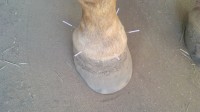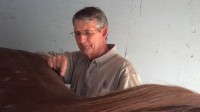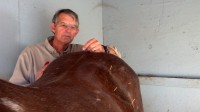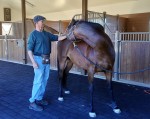 Part I of this series introduced Low Level Light Therapy and Reiki. This month, I’ll be discussing the role of Acupuncture in a balanced equine health & wellness program. As mentioned in Part I, your horse’s health care team will, of course, be headed up and overseen by your veterinarian. Your choice of therapies & therapists should be well researched. The intent, skill, knowledge, training and experience of a practitioner will be a significant factor in making your decision. You may also want to include referrals from friends, other horse owners, and trainers you know and respect.
Part I of this series introduced Low Level Light Therapy and Reiki. This month, I’ll be discussing the role of Acupuncture in a balanced equine health & wellness program. As mentioned in Part I, your horse’s health care team will, of course, be headed up and overseen by your veterinarian. Your choice of therapies & therapists should be well researched. The intent, skill, knowledge, training and experience of a practitioner will be a significant factor in making your decision. You may also want to include referrals from friends, other horse owners, and trainers you know and respect.
Acupuncture is one complimentary therapy you may be interested in for your horse(s), but may not have experienced first hand. Although the practice of acupuncture is estimated to be at least 3,000 years old, its use on horses in this country is relatively new. Equine acupuncture was first employed in the U.S. in the 1970’s within the racing industry. As drug testing became more common, owners and trainers looked to non-drug based medicine to enhance performance and promote the health and well-being of their equine athletes. Equine acupuncture has steadily grown in popularity and use since then, and is now utilized in many veterinary practices here in the USA and around the world.
How Acupuncture Works:
 In Eastern philosophy, when the free flow of energy is disrupted in any way; by emotions, diet, climate, over/under work, trauma, infection, heredity, etc., disease can manifest, because health depends upon a harmonious and sufficient flow of energy to all parts of a body.
In Eastern philosophy, when the free flow of energy is disrupted in any way; by emotions, diet, climate, over/under work, trauma, infection, heredity, etc., disease can manifest, because health depends upon a harmonious and sufficient flow of energy to all parts of a body.
There are 14 major meridians, or pathways, in which energy flows in any body. The names of these meridians are: Heart, Small Intestine, Triple Warmer, Large Intestine, Lung, Bladder, Gall Bladder, Stomach, Liver, Spleen, Governing Vessel, and Conception Vessel. Within those 14 meridians are hundreds of “acupoints”, which serve to access the meridians. A pre-treatment assessment of your horse will determine which acupoints are to be used. This assessment will likely consist of a thorough palpation, observation of the horse’s movement, mood evaluation, the owner’s/trainer’s concerns, and a practitioner’s own intuition. By inserting and stimulating fine, filiment-like, sterile needles into specifically chosen acupoints, an acupuncturist balances the flow of energy within the meridians.
Acupuncture can be utilized to treat numerous conditions, including musculoskeletal pain, arthritis, skin issues, ligament & tendon problems, gastrointestinal and endocrine imbalances, inflammation, mood disorders, and more.
Frequency Of Treatment:Â
 Acupuncture is often utilized as a preventative modality, because imbalances will often manifest energetically before there are observable changes. Owners can avoid much pain and suffering on the part of their horses by incorporating acupuncture “tune-ups” on a 4-6 week basis. This keeps a body’s energetic system balanced and less likely to invite, encourage, or fall prey to disease, discomfort, or injury.
Acupuncture is often utilized as a preventative modality, because imbalances will often manifest energetically before there are observable changes. Owners can avoid much pain and suffering on the part of their horses by incorporating acupuncture “tune-ups” on a 4-6 week basis. This keeps a body’s energetic system balanced and less likely to invite, encourage, or fall prey to disease, discomfort, or injury.
Each case is totally unique, but the rule of thumb is that 2-4 initial treatments (a course) for most patients will either alleviate the condition completely or give the acupuncturist a very good idea of how many treatments or “courses” will be needed to bring a patient’s energetic system in to balance. Very rarely, acupuncture is simply not effective on an individual, or the effects are minimal. In such cases, the owner should seek another modality, or practitioner, more suited and acceptable to their horse.
Is Acupuncture Painful?Â
 Acupuncture, in the vast majority of cases, is not painful at all…quite the contrary! Both human and animal patients generally finish their treatments feeling calm and relaxed. Horses will often lick, chew, yawn and roll their eyes during acupuncture treatments. These reactions are caused by a release of endorphins, and usually last 2-12 hours. For this reason, it is recommended that a horse be given the day off after their treatment. They may be somewhat unfocused or “spacy” while their bodies adjust to the movement of energy that occurs as a result of an acupuncture treatment. This “side effect” usually normalizes within 24 hours.
Acupuncture, in the vast majority of cases, is not painful at all…quite the contrary! Both human and animal patients generally finish their treatments feeling calm and relaxed. Horses will often lick, chew, yawn and roll their eyes during acupuncture treatments. These reactions are caused by a release of endorphins, and usually last 2-12 hours. For this reason, it is recommended that a horse be given the day off after their treatment. They may be somewhat unfocused or “spacy” while their bodies adjust to the movement of energy that occurs as a result of an acupuncture treatment. This “side effect” usually normalizes within 24 hours.
Acupuncture needles are usually about as thin as a few shafts of hair. It is not uncommon that human gauge needles are used on horses, however, some equine acupuncturists may use heavier gauge and longer needles. Different Veterinary Acupuncture training institutions espouse the use of varying gauges and lengths of needles and needling techniques. In more than 22 years of working with horses, I’ve observed that bigger is not necessarily better. Again, an acupuncture treatment should be a pleasant experience, not one filled with stress, pain, or anxiety. I have found that horses are exquisitely sensitive creatures; much more so than humans. It stands to reason that with such a creature, we should respect and protect that sensitivity. It is important to trust your intuition and your horse’s reactions toward a practitioner.
Acupuncture, as with most forms of medicine, is ever evolving. I’m still amazed at how often something new and exciting presents itself when I’m in the presence of horses receiving acupuncture. Hopefully, you will agree that acupuncture is a worthwhile tool you choose to utilize in your overall equine health care program.
I hope that this article has sparked your interest in equine acupuncture and trust that you will explore the subject further. Feel free to contact me with any questions you may have. I’ll do my best to answer them and/or direct you to further sources of information.
Happy, Healthy Trails!
Maggie
Biographies of Rod & Maggie:
 Rod’s training in acupuncture began n 1985 at the California Acupuncture College in Santa Barbara, CA.  In 1987, he received his clinical training in acupuncture and laser therapy certification at the World Health Organization’s Open University for Complimentary Medicines, in Colombo, Sri Lanka.  Rod subsequently received his doctorate in complimentary medicines (specializing in acupuncture) from his same institution in 1989.
Rod’s training in acupuncture began n 1985 at the California Acupuncture College in Santa Barbara, CA.  In 1987, he received his clinical training in acupuncture and laser therapy certification at the World Health Organization’s Open University for Complimentary Medicines, in Colombo, Sri Lanka.  Rod subsequently received his doctorate in complimentary medicines (specializing in acupuncture) from his same institution in 1989.
Rod and wife, Maggie, operated a human acupuncture clinic in Mulege, Mexico from 1989-91.  Rod’s equine training and experience began in Mexico and continued in Del Mar, CA, where he was under the tutelage of equine specialist, Chris Ross, D.V.M.
Maggie is a graduate of the University of California at Santa Barbara, a certified equine Sports Massage Therapist, trained laser therapist and certified Reiki Master (2002).
Rod and Maggie’s Bio-Energetic Therapies was born on the Central Coast of California in late 1991.  They performed acupuncture, laser therapy and Reiki for 8 years (1997-2004) on the “A†hunter/jumper horse show circuit and regularly traveled throughout Northern California, Oregon and Washington, working on horses.  In 2006, they made the difficult decision to semi-retire.  They work now, with the rare exception, in close proximity to their home on the Central Coast of California.
Rod Raymond, D.Ac.
Maggie O’Brien, Reiki Master
805-929-5240 /Â 805-878-0822 (cell)

